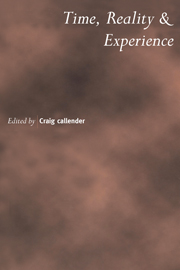Book contents
- Frontmatter
- Contents
- Preface
- Notes on Contributors
- When Time Gets Off Track
- Burbury's Last Case: The Mystery of the Entropic Arrow
- Zeno's Arrow and the Significance of the Present
- Presentism, Ontology and Temporal Experience
- A Presentist's Refutation of Mellor's McTaggart
- Time and Degrees of Existence: A Theory of ‘Degree Presentism’
- McTaggart and the Truth about Time
- On Absolute Becoming and the Myth of Passage
- Time Travel and Modern Physics
- Freedom from the Inside Out
- On Stages, Worms and Relativity
- On Becoming, Cosmic Time and Rotating Universes
- How Relativity Contradicts Presentism
- Can Physics Coherently Deny the Reality of Time?
- Rememberances, Mementos, and Time-Capsules
When Time Gets Off Track
Published online by Cambridge University Press: 05 May 2010
- Frontmatter
- Contents
- Preface
- Notes on Contributors
- When Time Gets Off Track
- Burbury's Last Case: The Mystery of the Entropic Arrow
- Zeno's Arrow and the Significance of the Present
- Presentism, Ontology and Temporal Experience
- A Presentist's Refutation of Mellor's McTaggart
- Time and Degrees of Existence: A Theory of ‘Degree Presentism’
- McTaggart and the Truth about Time
- On Absolute Becoming and the Myth of Passage
- Time Travel and Modern Physics
- Freedom from the Inside Out
- On Stages, Worms and Relativity
- On Becoming, Cosmic Time and Rotating Universes
- How Relativity Contradicts Presentism
- Can Physics Coherently Deny the Reality of Time?
- Rememberances, Mementos, and Time-Capsules
Summary
Over the last forty years, philosophers have argued back and forth about backward causation. It requires a certain structure of time for something as backward causation to be not only possible but also to take place in the real world. In case temporal becoming is an objective feature of the world in the sense that the future is unreal, or at least ontologically indeterminate, it is impossible to see how backward causation can arise. The same difficulty does not hold with respect to forward causation. For even though it is assumed according to one dynamic view of time, the instant view or presentism, that merely present events exist—and past events therefore are no longer real or have become ontologically indeterminate—such a view can still maintain that past events once were there to cause present events. Future events, however, are still to come, and being indeterminate or nothing at all, they cannot cause any events in the present. In other words, causation backwards in time can occur only if we think of time as static; that is, no objective becoming exists, and the world consists of tenselessly occurring future events that exist in the same sense as past and present events. Backward causation requires the so-called full view, or possibly the half-full view, of time.
It has been argued that another dynamic theory of time may allow for the logical possibility of backward causation.
- Type
- Chapter
- Information
- Time, Reality and Experience , pp. 1 - 18Publisher: Cambridge University PressPrint publication year: 2002
- 2
- Cited by

